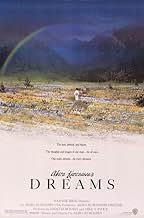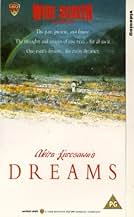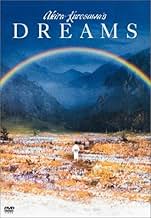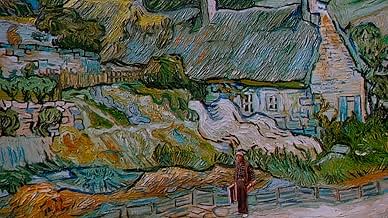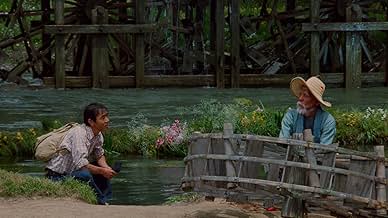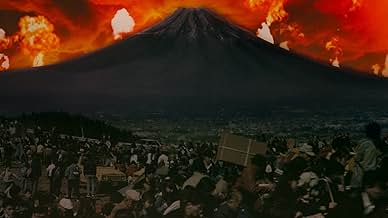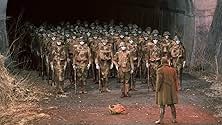Eine Sammlung von Geschichten, die auf den aktuellen Träumen des Regisseurs Akira Kurosawa basiert.Eine Sammlung von Geschichten, die auf den aktuellen Träumen des Regisseurs Akira Kurosawa basiert.Eine Sammlung von Geschichten, die auf den aktuellen Träumen des Regisseurs Akira Kurosawa basiert.
- Regie
- Drehbuch
- Hauptbesetzung
- Auszeichnungen
- 3 Gewinne & 12 Nominierungen insgesamt
Empfohlene Bewertungen
Going back to what made Akira Kurosawa a star, Dreams is a film driven by a completely original concept. Like Rashomon, this is something that had never been done before. To my knowledge, nobody since has had the skill or guts to make a movie that accurately captures the spirit of........ bizarre Dreams. These stories are filmed and written just like real dreams. They're full of strange events that most of the time make no sense, yet everyone in the story totally believes it to be normal.
My favourite segments are "The Tunnel", as story where a former military commander encounters the ghosts of all the soldiers who died under his command. The Commander explaining why his soldiers died is hands down the best acting in the movie. My second favourite wold be "The Peach Orchard". This is about a young boy that finds a group of living dolls in the fields. The dolls are furious that the boy's family have destroyed all the peach tress in the Orchard. This segment was the most dreamlike. My third favourite would be "Mount Fuji In Red". In that there is a nuclear meltdown. Panic spreads and a few survivors contemplate whether or not to end their lives.
In traditional Kurosawa fashion, this movie is visually breathtaking. Kurosawa films don't just look great, they look unique and interesting. The visuals in Dreams helps create the hypnotic dream-like state. In the "Crows" story, a man enters the world of a Van Gogh painting. Parts of the scenery here are natural landscapes, and parts are made to look like a painting. In "Blizzard" mountain climbers are on the verge of death. They're rescued by a snow spirit. The blinding snow and the sort of slow motion effect when you see the Snow Fairy makes this segment perhaps the most hypnotic images Kurosawa has ever produced.
I wouldn't want anyone to get the idea that this is just a bunch of unconnected segments. Several characters appear in various segments, and some are meant to play back to back. I have to say that Dreams may not be for everyone. I'd recommend everyone alive check it out, though. Some may love it, some may not understand it. I'm on the side of this being one of the last brilliant works of the World's greatest Director.
My favourite segments are "The Tunnel", as story where a former military commander encounters the ghosts of all the soldiers who died under his command. The Commander explaining why his soldiers died is hands down the best acting in the movie. My second favourite wold be "The Peach Orchard". This is about a young boy that finds a group of living dolls in the fields. The dolls are furious that the boy's family have destroyed all the peach tress in the Orchard. This segment was the most dreamlike. My third favourite would be "Mount Fuji In Red". In that there is a nuclear meltdown. Panic spreads and a few survivors contemplate whether or not to end their lives.
In traditional Kurosawa fashion, this movie is visually breathtaking. Kurosawa films don't just look great, they look unique and interesting. The visuals in Dreams helps create the hypnotic dream-like state. In the "Crows" story, a man enters the world of a Van Gogh painting. Parts of the scenery here are natural landscapes, and parts are made to look like a painting. In "Blizzard" mountain climbers are on the verge of death. They're rescued by a snow spirit. The blinding snow and the sort of slow motion effect when you see the Snow Fairy makes this segment perhaps the most hypnotic images Kurosawa has ever produced.
I wouldn't want anyone to get the idea that this is just a bunch of unconnected segments. Several characters appear in various segments, and some are meant to play back to back. I have to say that Dreams may not be for everyone. I'd recommend everyone alive check it out, though. Some may love it, some may not understand it. I'm on the side of this being one of the last brilliant works of the World's greatest Director.
Sentimentally I love this film, made by Kurosawa when he was 80 and one of his last. The great director gives us eight vignettes that often seem more like messages than dreams, speaking to the danger of nuclear power, damaging the environment, and senseless death in war. Guilt is a recurring theme, and as the film covers childhood to old age, it seems very personal to Kurosawa's own life. The images are often beautiful, and I absolutely loved dream #5, "Crows," where an art student runs through Van Gogh's paintings and meets him. The highlighted work, "Wheatfield with Crows" is so profoundly meaningful to the end of Van Gogh's life that seeing it here in the elderly Kurosawa's work gave me goosebumps. I didn't mind the preachiness that's in several of the other dreams too much, though it did take away from the film's surreal feeling, but the bigger issue was pace, which was almost always too slow. It's a must-watch film for fans of Kurosawa and I'm glad I saw it, but it needing paring down.
I am not inclined to post my opinion on web pages. In fact, this is the first time that I feel compelled to let my words be heard on the web. However, having read from other users that "Yume" is "a waste of time" and "too personal" to be enjoyed, I was so disappointed that I felt the right time to speak up had come.
I am the first one to agree that this is not a film for everyone. It is actually far from that. Alas, in this world where the vastest majority of people feel that the necessary and sufficient condition for a film to be good is to have as much special effects as possible, "Yume" sadly faces no other fate than to be overlooked by almost everybody.
It is those few people that might consider watching this film that have the opportunity to appreciate its full greatness. There are still many hurdles on the way, though. For many Western people, including myself, the fact that "Yume" orbits around Japanese legends is a big obstacle to overcome, as we are not well acquainted with their meaning. I am convinced that Kurosawa's "Dreams" conceal much of their true objective to us who are not familiar enough with the Japanese culture.
But my advice is: forget these problems. There are thousands of other details to enjoy. From just a cinematographic point of view, Kurosawa's mastery of colour is unrivaled, and a sound reason to watch this film, yet not the only one by far. The true value of "Yume", in my opinion, is the use of the parabolas presented disguised as dreams to teach us a way of life. The absurdity of war. The beauty of nature. The need to preserve our environment. In summary: a praise to life. And yet, Kurosawa being old himself when he filmed his "Dreams", looks at death and presents it as the last station of a wonderful journey. Carpe diem, yes, but not to the point of being scared. Life will follow its course as does the river at the end of the movie, with or without us being here to enjoy it. Just be thankful for the small things in life; they are the most important. Enjoy them while you can and you will leave this existence in peace with yourself.
"Yume" is one of these small, humble things, so humble that it can be overlooked by many. It would be a waste. Don't let this happen to you. You would miss a true masterpiece. You would miss Kurosawa's way of life.
I am the first one to agree that this is not a film for everyone. It is actually far from that. Alas, in this world where the vastest majority of people feel that the necessary and sufficient condition for a film to be good is to have as much special effects as possible, "Yume" sadly faces no other fate than to be overlooked by almost everybody.
It is those few people that might consider watching this film that have the opportunity to appreciate its full greatness. There are still many hurdles on the way, though. For many Western people, including myself, the fact that "Yume" orbits around Japanese legends is a big obstacle to overcome, as we are not well acquainted with their meaning. I am convinced that Kurosawa's "Dreams" conceal much of their true objective to us who are not familiar enough with the Japanese culture.
But my advice is: forget these problems. There are thousands of other details to enjoy. From just a cinematographic point of view, Kurosawa's mastery of colour is unrivaled, and a sound reason to watch this film, yet not the only one by far. The true value of "Yume", in my opinion, is the use of the parabolas presented disguised as dreams to teach us a way of life. The absurdity of war. The beauty of nature. The need to preserve our environment. In summary: a praise to life. And yet, Kurosawa being old himself when he filmed his "Dreams", looks at death and presents it as the last station of a wonderful journey. Carpe diem, yes, but not to the point of being scared. Life will follow its course as does the river at the end of the movie, with or without us being here to enjoy it. Just be thankful for the small things in life; they are the most important. Enjoy them while you can and you will leave this existence in peace with yourself.
"Yume" is one of these small, humble things, so humble that it can be overlooked by many. It would be a waste. Don't let this happen to you. You would miss a true masterpiece. You would miss Kurosawa's way of life.
I was pleasantly surprised with dreams, not only in terms of content but also aesthetically. There are very few films that manage to embody personal, local and global concerns as Akira Kurosava has managed in this production. There are so many underlying topics that it is difficult to concentrate in just a few for the purpose of this review, but I believe it is fair to say that Dreams portrays our individual and collective dreams and nightmares, reflecting that sometimes what we dream of today is what will keep us awake tomorrow. A nice range of representations of concerns from the deepest and most personal childhood worries and fantasies to the more complex issues of mental illness, extreme ambition, destruction of our environment and death. In all I recommend this film to anyone who has the chance to see it, It is possible that Dreams may not appeal to a mainstream audience in terms of content because there is a lot of symbolism and critical engagement but the photography and sceneries are for sure something that should not go amiss for anyone. If you get the chance it is truly worth giving it your time, a fantastic experience.
Truly one of the most beautiful films I have ever seen. I saw this film for the first time in 1993 and it was placed forever in my mind as one of my greatest cinematic experiences. I agree with what another reviewer said about this film, that it is not for everyone. It is very artistic in that the cinematography carries a lot of the story and some may become bored with it. Hollywood has a way of brainwashing a lot of viewers into needing a lot of dialog or action. If that's what you're after, you wont find it here. You have to use your brain for this one. This movie is Japanese and what little dialog there is, is in subtitled for the American viewer. So you may need to do a little reading. This is not simply a movie; it is several short, amazing stories that stem from the mind of Akira Kurosawa (a genius in my book). One is like a beautiful fairytale and another is a nightmarish fable and still another is a terribly haunting ghost story, there are others but all are done very well. This film needs to be seen in the letterbox format as it was intended. The cinematography, as I said earlier, contributes so much that it should be viewed completely. I really don't know what else to say about this movie except that if you have an artistic streak and like to see how movies can become art I would highly recommend Yume (Dreams).
Wusstest du schon
- WissenswertesAkira Kurosawa had trouble getting financing from studios in Japan, blaming much on the political nature of his criticism of nuclear power in the film. He sent a copy of his script to Steven Spielberg, who liked it, and helped get a deal for the film through Warner Bros.
- VerbindungenEdited into Gli ultimi giorni dell'umanità (2022)
- SoundtracksIn the Village
(from "Caucasian Sketches, Suite for Orchestra Op. 10, No. 2")
Music by Mikhail Ippolitov-Ivanov (as Ippolitov-Ivanov)
Conducted by Vladimir Fedoseyev (as Vladimir Fedoseev)
Performed by Moscow Radio Symphony Orchestra
Top-Auswahl
Melde dich zum Bewerten an und greife auf die Watchlist für personalisierte Empfehlungen zu.
- How long is Dreams?Powered by Alexa
Details
Box Office
- Budget
- 12.000.000 $ (geschätzt)
- Bruttoertrag in den USA und Kanada
- 1.963.207 $
- Weltweiter Bruttoertrag
- 2.970.161 $
- Laufzeit
- 1 Std. 59 Min.(119 min)
- Farbe
- Sound-Mix
- Seitenverhältnis
- 1.85 : 1
Zu dieser Seite beitragen
Bearbeitung vorschlagen oder fehlenden Inhalt hinzufügen



